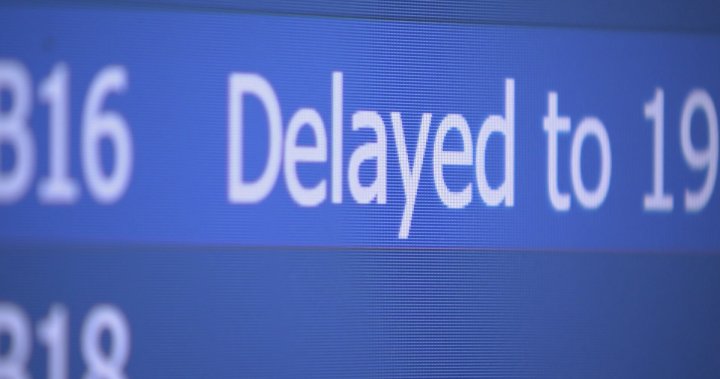Article – Air traffic chaos struck Canada’s west coast this week as Vancouver International Airport (YVR) faced significant delays and cancellations, leaving thousands of passengers stranded and airlines scrambling to adjust schedules.
The root cause? A critical shortage of air traffic controllers that experts say has been building for years.
At Terminal 3 yesterday afternoon, I watched as Jennifer Kwan checked the departure board for the fifth time in two hours. Her flight to Calgary, already delayed three times, now showed a vague “check with airline” status.
“I’ve been here since 6 a.m.,” said Kwan, a marketing executive who was missing an important client meeting. “The airline staff keep saying it’s an air traffic control issue, but nobody seems to know when it will be resolved.”
She wasn’t alone. By midday, more than 30% of departures were delayed by at least 90 minutes, according to FlightAware tracking data. Air Canada and WestJet reported at least 40 cancellations between them.
The crisis stems from what NAV CANADA, the private corporation that manages our air traffic services, describes as “an unexpected staffing shortage” at Vancouver Control Tower. Industry insiders, however, suggest this shortage represents the tip of a much larger iceberg.
“This isn’t just a bad day or a blip,” said Martin Reynolds, aviation analyst with the Canadian Transportation Policy Institute. “We’re seeing the consequences of years of inadequate recruitment and retention programs colliding with increased air travel demand.”
NAV CANADA acknowledged in a statement that staffing at YVR was operating at approximately 67% of optimal levels this week, well below the safety margin typically maintained at major international airports.
“We’re implementing contingency measures to ensure safety while working to minimize disruptions,” the statement read, though it offered little concrete information about timeline for resolution.
For the aviation community, this crisis was predictable. Captain Teresa Burrows, a senior pilot with 27 years of experience flying Canadian routes, told me she’s watched the controller shortage develop for years.
“Controllers are retiring faster than they’re being replaced,” Burrows explained during a phone interview between flights. “Training a fully certified controller takes years, not months, and the pandemic created a backlog in the certification pipeline that we haven’t recovered from.”
The Canadian Air Traffic Control Association reports that nationwide, controller numbers are down nearly 15% since 2019, while air traffic has rebounded to 92% of pre-pandemic levels.
At YVR specifically, the situation appears even more dire. A source within the airport’s operations team, speaking on condition of anonymity, confirmed they’ve been operating with “critically thin” controller coverage for months, using overtime and schedule adjustments to maintain service.
“What happened this week was entirely predictable,” the source said. “We lost three controllers to illness at once, and there simply wasn’t enough depth on the roster to cover the gaps.”
The shortage created a cascade of disruptions. To maintain safety standards, NAV CANADA implemented flow control measures, reducing the number of aircraft that could take off or land each hour by approximately 40%.
For passengers, the impact was immediate and painful. Departure lounges filled beyond capacity. Customer service desks were overwhelmed with rebooking requests. Hotels near the airport reported complete sellouts by early evening.
Emma Croft, traveling with two young children to visit family in Winnipeg, spent seven hours at the airport before her flight was eventually cancelled.
“The kids are exhausted, I’m exhausted, and now we’re told the next available flight isn’t until tomorrow afternoon,” Croft said. “The airline gave us meal vouchers, but they don’t cover a hotel room for the night.”
The economic ripple effects extend far beyond passenger inconvenience. Cargo operations faced significant delays, with time-sensitive shipments of pharmaceuticals, seafood, and manufacturing components backed up in warehouses.
BC’s Tourism Minister Hannah Johnson expressed concern about potential impacts to the province’s crucial tourism sector. “Vancouver serves as our gateway to international visitors,” Johnson noted in a statement. “Extended disruptions at YVR could affect confidence in our destination reliability.”
Federal Transportation Minister David Williams acknowledged the severity of the situation during a media availability in Ottawa yesterday.
“We’re working closely with NAV CANADA to address both immediate operational needs and the longer-term recruitment challenges,” Williams said. “Air transportation is essential infrastructure, and Canadians deserve reliability.”
However, quick fixes seem unlikely. According to Transport Canada documents obtained through previous access to information requests, the controller training program faces significant bottlenecks. The specialized simulators needed for training are limited, and experienced controllers who serve as on-the-job instructors are the same ones needed to staff control towers.
The current shortage appears particularly acute among controllers qualified for instrument approach procedures – critical for YVR’s frequent fog and low-visibility operations.
Some airlines have responded by preemptively cancelling flights through the weekend, hoping to provide passengers with earlier notification rather than last-minute disruptions.
WestJet announced it would reduce its YVR schedule by 15% through Sunday, while Air Canada advised passengers on non-essential travel to consider rebooking for next week without penalty.
Aviation experts suggest this crisis should serve as a wake-up call for Canada’s air transportation infrastructure planning.
“We’ve seen warning signs for years,” said Reynolds. “Controller staffing, airport capacity, airline scheduling – these systems are all interdependent, and they’re all stretched to breaking point.”
For now, passengers are advised to check flight status before heading to the airport and to build flexibility into travel plans. NAV CANADA expects gradual improvement as they implement emergency staffing measures, including bringing controllers from other regions to temporarily supplement YVR operations.
Back at Terminal 3, Jennifer Kwan finally received word that her flight would depart, nearly five hours late.
“I get that safety comes first,” she said, gathering her bags. “But it feels like the system shouldn’t be this fragile. One staffing problem shouldn’t cripple an entire airport.”






